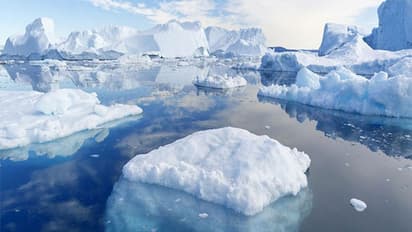'Glasgow glacier': A glacier in Antarctica named in honour of Scottish city hosting UN climate summit

Synopsis
Aside from Glasgow, the eight newly named glaciers are Geneva, Rio de Janeiro, Berlin, Kyoto, Bali, Stockholm, Paris, and Incheon, all of which are named after towns that hold key UN climate conference.
A glacier in far-off Antarctica has been formally dubbed Glasgow Glacier in honour of Glasgow, Scotland, which is hosting the high-level UN climate conference, which began on Sunday, starting two weeks of intense diplomatic negotiations on mitigating global warming. The 100-kilometre-long body of ice, which has been rapidly melting, was formally named by researchers at the University of Leeds to commemorate the 26th Conference of Parties (COP26) of the United Nations Framework Convention on Climate Change (UNFCCC), serving as a stark reminder of why such immediate action is required.
According to British Prime Minister Boris Johnson, naming this sparkling titan of nature after the city where humanity will meet to battle for the planet's future serves as a clear reminder of what we are trying to protect. "Our greatest opportunity is in Glasgow. The answers are in our hands, just as the G-20 has a common obligation to act. I hope that nations would assemble next week in a spirit of responsibility and ambition to keep the 1.5 degree Celsius target alive," Boris Johnson opined.
Also Read | Here's what G20 leaders final statement on climate stated; Details inside
Aside from Glasgow, the eight newly named glaciers are Geneva, Rio de Janeiro, Berlin, Kyoto, Bali, Stockholm, Paris, and Incheon, all named after towns that hold key UN climate conferences.
Heather Selley, a PhD student at Leeds' School of Earth and Environment, discovered 14 glaciers in West Antarctica's Getz Basin that are shrinking by an average of 25% owing to climate change between 1994 and 2018. Her study, published in February 2021, discovered that 315 gigatonnes of ice had been lost from the region in the previous 25 years. This is the equivalent of 126 million Olympic-sized swimming pools of water.
Also Read | PM Modi, several world leaders visit iconic Trevi Fountain in Rome on sidelines of G20 summit
Climate change has become linked with dramatic shifts in ice cover and photographs of Antarctica. Satellites have detected massive iceberg calving episodes, changes in glacier flow, and rapidly diminishing ice over the last 40 years, illustrating the disastrous impact of global warming. Downing Street stated that the UK's message at the G-20 Summit in Rome on Sunday will be to underline how, 50 years ago, the UK drew almost 80% of its power from coal-burning, and how, nine years ago, that figure was nearly 40%, and today it is less than 2%. The United Kingdom intends to entirely phase out the use of coal in electricity generation by 2024.
Check the Breaking News Today and Latest News from across India and around the world. Stay updated with the latest World News and global developments from politics to economy and current affairs. Get in-depth coverage of China News, Europe News, Pakistan News, and South Asia News, along with top headlines from the UK and US. Follow expert analysis, international trends, and breaking updates from around the globe. Download the Asianet News Official App from the Android Play Store and iPhone App Store for accurate and timely news updates anytime, anywhere.